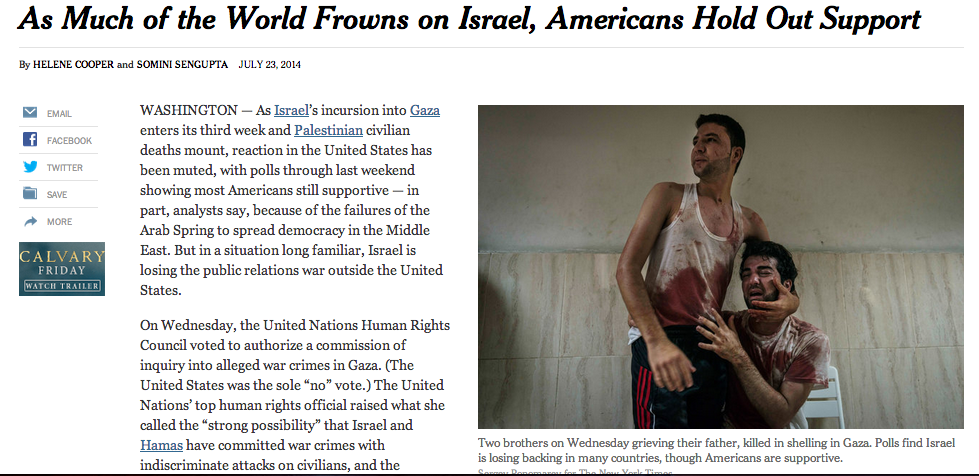by Ali Gharib
You’d think a Senior Editor at a major national magazine might know to check out his sources. You’d think such a Serious Person would look into a blog that’s making a serious accusation against a reputable journalist. You’d think David Frum would know better. You’d be wrong.
Late last week, Frum, a senior editor at the Atlantic, went on a short tangent on Twitter about a series of photographs from Gaza that appeared in Reuters, the Associated Press and the New York Times. Frum focused his ire on the latter. Here is one of his tweets:
Obviously faking photos is not as serious as lese-majeste vs @ggreenwald http://t.co/HaiQInIhtK – but it’s still *something*, right?
— David Frum (@davidfrum) July 24, 2014
The Times photo, by Sergey Ponomarev, an AP veteran and regular Times contributor, shows one blood-soaked man comforting another in the hallways of a hospital near Rafah, a town in the southern Gaza Strip. In a dozen or so tweets, the former George W. Bush speechwriter declared the photos fakes — not allegedly fakes, but fakes, full-stop — and berated the Times’s public editor, Margaret Sullivan. Frum’s source? An obscure blog run by a man named Thomas Wictor
I spoke with Wictor by phone today. His is a tragic story. A self-described “failed music journalist” and “failed novelist” — “As of right now, I’m a failed everything,” he tells me — Wictor says that two literary agents defrauded him of his life-savings and managed to kill his latest book project. His website bio says: “To do so they took advantage of his post-traumatic stress disorder with secondary psychotic features, as well as the ‘brain fog’ caused by Meniere’s disease. Both of these conditions create memory lapses and dissociation, which were exacerbated by the suicides of Wictor’s parents in February and October of 2013.”
In light of this history — and some other details, more on which in a bit — I asked Wictor if he thought he made for a reliable source. “I don’t care,” he told me. “My writing career was completely destroyed by these con artists and I don’t care.”
I won’t bother too much with Wictor’s theories about why the photos are faked. For that, you can visit Bag News, a blog about photojournalism and other forms of visual documentary run by professional journalists and journalism experts, where Michael Shaw has done a deep dive on Wictor’s post. But it’s worth noting that the Times’s international photo editor David Furst was unequivocal that the paper stood by Ponomarev’s shots. “We have investigated the allegations being made against photographer Sergey Ponomarev,” Furst told me, “and have definitively concluded that they have no foundation and are absolutely without merit.”
That’s not a surprise to Wictor. “Of course. That’s fine,” he says. “Oh yeah, it’s possible that I’m completely wrong about everything. This is just opinion.” I pointed out to Wictor that he displayed a propensity for jumping from conjecture to full-blown assertions. “I’m a very assertive person,” he replied. “I believe that these are obvious fakes, but I could be wrong.”
In a separate post, Wictor had written that an alleged shooting victim in Gaza “has a beard with no mustache, which means he’s a Hamas operative.” I suggested that such a facial-hair profile wasn’t as airtight as he seemed to think. He responded: “A beard with no mustache has a very different meaning in Gaza than it would in Pennsylvania” — a reference to the Amish, who wear their beards this way — “or in Israel.”
If Frum had done a little more digging, he would have found other posts on Wictor’s blog that call into question his credibility. Frum might have discovered some of Wictor’s recent free-associative rhapsodies or winding disquisitions on minstrel shows. Frum might’ve even found Wictor’s post where he thinks he has taken a photo of a “dematerializing” cat — apparently the second coming of a ghost cat Wictor knew earlier in life.
When prodded on whether the dematerializing cat thing was serious or ironic, Wictor laughed. “No, it is serious. You can present me as completely off my rocker,” he says. “The fact is I took a picture of a cat that looked like my beloved dead cat, and when the shutter snapped the cat was gone. I tend to believe that when we’re under a lot of stress and pain, we can hallucinate. Sure, why not? But I also believe that we might get signs to help us carry on.”
Wictor spoke about “Pallywood,” the term pro-Israel activists use to describe allegedly fake videos of Palestinian suffering. “People don’t tell the truth,” he tells me. “This is a propaganda war.” He doesn’t trust major media outlets: “I understand that AP and Reuters are giants, but I have myself seen so much bias in them that I don’t respect them at all.”
Wictor backed up his gentle demeanor on the phone — he encouraged me to ask him about anything, always polite and frank — with a note about how he viewed the current Gaza war: “I don’t take any joy in this war. I’m not waving, cheering, going, ‘Go! Kill Palestinians!’,” he explains, adding with a touch of humor, “If I could press a magic button I would dematerialize all the Hamas guys.”
Reading over Wictor’s blog, it’s clear that he’s not entirely well, and that his analysis is wanting. Which all raises the question of what exactly Frum was thinking questioning a bevy of professional journalists based on Thomas Wictor’s writings.
Wictor, for whatever it’s worth, doesn’t even have a very good grasp of Frum’s politics. “David Frum, as we all know, is not particularly pro-Israel,” he told me. When I demurred, Wictor explained: “David Frum is what people call a squish. He’s for ceasefires and for Israelis getting along. What’s the phrase? Going along to get along. He’s not a fire-breather by any stretch of the imagination.” (I’ve reached out to Frum for comment by phone and e-mail, and will update if I hear anything.)
For his part, Frum is already reconsidering his position: “I cast doubt on the authenticity of a casualty photo from Gaza. This blogger says I was wrong,” Frum wrote in a tweet today, referencing the Bag News post. “I’ll review & reply.” But Frum didn’t “cast doubt” on the photo. That’s far too mild. He didn’t allege fakery, he factually asserted it.
I hope Frum does indeed review his statements and revises them; his accusations of journalistic malpractice are serious. But even if he does revise his opinion, one is left wondering: how did one journalist at a major national magazine decide to lob allegations of fraud at a major newspaper with incredibly thin evidence from an unreliable source?






The dematerializing cat is real, but Mr Gharib correct about the rest
Great, well written piece of journalism. Thank you
Great site. Will make it a daily read.
Don’t hold your breath awaiting those updates…guaranteed that there will be none forthcoming.
Frum is an incorrigible fraud. Why anyone thinks he’s a “journalist’ is beyond me.